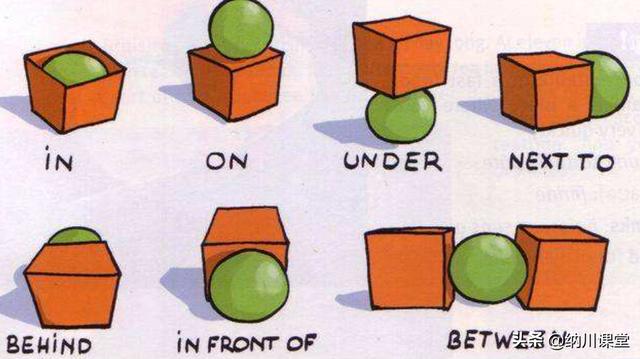介词用法最全总结一张图总结(最全常用介词用法辨析)
介词是英语学习的一大难点,也是必考知识点,同学们在学习英语介词的时候很容易将类似的介词使用混淆,今天纳小川总结了常用介词的辨析,有需要的同学们可以收藏哦。

⑴ 时间或地点介词in、on、at、to的用法区别:
表示时间时, in表示在一段时间里(在将来时句子中则表示在一段时间之后);on表示在具体的某一天或者某天的上下午等, at表示在某个时刻或者瞬间。如:
He was born on the morning of May 10th.(他出生于五月十日的早晨)
I usually get up at 7:00 in the morning.(我通常在早上的七点钟起床)
表示地点时, in表示在某个范围之内;on表示在某个平面上或与一个面/地点相接触/相邻; to表示不相邻且不在某个范围内;at则表示在某个具体的场所或地点。按照地点大小来划分:at<in.如:
His glasses are right on his nose.(他的眼镜就架在他的鼻子上)
He is at the cinema at the moment.(此刻他正在电影院)
Japan is to the east of China.(日本在中国的东方)
Chongqing is in the west of China(重庆在中国的西部)
Chongqing is on the east of Sichuan(重庆在四川东部)
⑵ after与in表示时间的用法区别:
“after (具体时刻/从句)”表示“在…时刻之后”常用于一般时态;“in (一段时间)”表示“在(多久)之后”,常用于将来时态。如:
He said that he would be here after 6:00.(他说他六点钟之后会来这儿)
My father is coming back from England in about a month.(我父亲大约一个月以后从英国回来)
⑶ since与for表示时间的用法区别:
“since (具体时刻/that-从句)”表示“自从…起一直到现在”,“for (一段时间)”表示“总共有…之久”,都常用于完成时态;如:
Uncle Li has worked in this factory since 1970.(李叔叔自从1970年起就在这家工厂工作了)
Uncle Li has worked in this factory for over 30 years. (李叔叔在这家工厂已经工作了30多年)
⑷ by、in与with表示方式的用法区别:
都可以表示“工具、手段”,但是by主要表示“乘坐”某个交通工具或“以……方式”,在被动句中可以表示动作的执行者;in表示“使用”某种语言/文字,with表示“使用”某个具体的工具、手段。如:
We see with our eyes and walk with our feet.(我们用眼睛看东西,用双脚走路)
Please write that article(文章) in English.(请你用英语写那篇文章)
Let’s go to the zoo by taxi.(我们打的去动物园吧。)
It was written by Lao She.(那是老舍写的)
⑸ about,on,of的用法区别:
都可以表示“有关…”,但是about的意义比较广,表示“关于。。。的”; 而on主要表示“有关…(学术性或严肃的事)”;of 仅指提到或谈到过某人或某事。如:
Tom is going to give a talk on the history of America.(汤姆要作一个美国历史的报告) They are very excited talking about the coming field trip.(他们兴致勃勃地谈论着即将来到的野外旅游)
He spoke of the film the other day.(他前几天谈到过这部电影)
⑹ through与across(cross)、over的用法区别:
across, cross是横过的意思,across是介词,通常在用go, run, swim等搭配;cross是动词,通常可以直接放在句子中;through是穿过,跟across一样是介词,通常与go, run, swim等连用。through,over与across的不同在于:through是“从中(内部)通过”;across是从事物表面通过;over是“在。。。上面过”。如:
Just then a rat (鼠)ran across the road.(就在那时一只老鼠跑过路面)
There is a bridge across/over the river.(河上有座桥)
They climbed over the mountain and arrived there ahead of time.(他们翻过大山提前到达了那里)/I stepped over a broken piece of wood.(我跨过一块破木头)
The visitors went through a big gate into another park.(参观者们穿过一个大门来到另一个公园)/We walked through the forest.(我们步行穿过了森林)
(7)as与like的区别:
两个词都表示“像……”,但是as译为“作为……”,表示的是职业、职务、作用等事实,而like译为“像……一样”,表示外表,不是事实。如:
Let me speak to you as a father.(我以父亲的身份和你讲话。)(说话者是听者的父亲) Let me speak to you like a father.(让我像一位父亲一样和你讲话)(说话者不是听者的父亲)
(8) at the end of、by the end of、to the end、in the end的用法区别:
at the end of…既可以表示时间也可以表示地点,译为“在…末;在…尽头”,常与过去时连用;by the end of…只能表示时间,译为“在…前;到…为止”,常用于过去完成时; in the end与at last基本等义,表示“终于、最后”,通常用于过去时;to the end译为“到…的终点为止”,前面往往有表示运动或连续性的动词。如:
By the end of last term we had learned 16 units of Book III.(到上学期期末我们已经学习了第三册16个单元)
At the end of the road you can find a big white house with brown windows.(在路的尽头你能找到一幢有棕色窗户的白房子)
They left for Beijing at the end of last week.(上周末他们动身去了北京)
In the end he succeeded in the final exams.(他最终在期末考试中考及格了)
We should go on with the work to the end.(我们应该把工作干到底)
Follow this road to the end and you will see a post office.(沿这条路走到底就能看见一家邮电局)
(9) for a moment、for the moment、in a moment、at the moment的区别:
for a moment“一会儿、片刻”(=for a while),常与持续性动词连用;for the moment“暂时、目前”,常用于现在时;in a moment“一会儿、立即、马上”(=soon; in a few minutes),一般用于将来时;at the moment“此刻,眼下”(=now),用于现在进行时。如:
Please wait for a moment.(请稍等)
Let’s leave things as they are for the moment.(暂时就维持现状吧!)
I’ll come back in a moment.(我过会儿回来)
I am very busy at the moment.(眼下我很忙)
(10)but的问题:
用介词but引出另一个动词时,要注意:如果前面有do,后面就用动词原形,前面没有do时,后面的动词要加to。如:
I could do nothing but wait.(我什么也做不了只能等)
They had no choice(选择) but to fight.(他们没有选择只有战斗)
(10)in front of 与in the front of:
in front of“在…的前面”, 与in the front of“在…的前部”。如:
A car was parking in front of the hall.(大厅跟前停着一辆汽车)
In the front of the hall stood a big desk.(大厅前部立着一个大讲台)
(12)except与besides的区别:
except“除了”,表示排除掉某人物,即不包含;而besides“除了”则表示包含,即“不仅……又……”。如:
Everyone went to the Palace Museum except Tom.(除了Tom,大家都去了故宫博物院)(Tom没有去故宫)
Besides Chinese he also studied many other subjects.(除了汉语之外,他还学其他许多功课)(“汉语”也是他学的功课之一)
(13) 表示材料的介词of和from的区别:
of指可以看出原料;from指不可看出原料,如:
The box is made of paper.(这个盒子是纸做的)
Wine is made from grapes.(葡萄酒是葡萄酿成的)
,免责声明:本文仅代表文章作者的个人观点,与本站无关。其原创性、真实性以及文中陈述文字和内容未经本站证实,对本文以及其中全部或者部分内容文字的真实性、完整性和原创性本站不作任何保证或承诺,请读者仅作参考,并自行核实相关内容。文章投诉邮箱:anhduc.ph@yahoo.com






